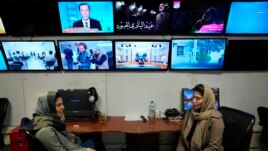12 September 2022
Taliban leaders of Afghanistan are praising the effects of their restrictions on the country's broadcasters. The new laws bar state and private television channels from showing programs considered offensive. This includes foreign movies and performances by female singers, as well as any material critical of Islam or the Taliban.
Hayatullah Mohajir Farahi is deputy information and culture minister in the Taliban Cabinet. "Ninety-five percent of the visual and audio media outlets in the country have been reformed," he told reporters in Kabul.
The Taliban has established a system to monitor all broadcasts to make sure they honor the rules on content. One rule, for example, requires all female broadcasters to cover their heads and faces when on television.

Afghan journalists Banafsha Binesh,and Wheeda Hassan at TOLO TV newsroom in Kabul, Afghanistan, Tuesday, Feb. 8, 2022.
Industry experts say the reforms amount to extensive suppression of a severely weakened Afghan media.
The Afghanistan Journalists Center (AFCJ) reports at least 245 cases of censorship, detentions and violence against media workers over the past year.
The Taliban says no reporters have died in the country since the group returned to power in August 2021.
"It's good news that no journalist has been murdered in the past one year, but we should also know that more than 130 journalists and media personnel were detained and some were tortured by the Taliban in the same period," said an AFCJ representative who requested to keep their identity secret over safety concerns.
The Committee to Protect Journalists reports that at least 10 journalists were killed in Afghanistan in 2020 and 2021. The Taliban was blamed for some of the deaths.
At least three reporters, several video producers and a U.S. filmmaker and his Afghan producer are in Taliban detention right now.
Recently, the Taliban announced a news media violations agency. It has no female members, journalists, or human rights representatives.
Since taking power, the Taliban have faced protests, mostly by women's rights activists. They call for the reopening of secondary schools for girls, employment and political rights for women. The Taliban have told media outlets to stay away from protests.
Mujahid said that "Recent protests have been illegal and therefore filming and reporting on them is also illegal." He added that protesters must get permission from Taliban officials to hold marches.
The U.N. and human rights organizations have condemned the Taliban's policies toward women and the press. On September 6, a U.N. human rights official said that the Taliban had limited the freedom of peaceful gatherings and used unnecessary force against protesters.
Hundreds of journalists and media personnel have left Afghanistan over the past year. More than 80 percent of female reporters have lost their jobs, media support groups say.
About 210 TV and radio stations and more than 100 publications remain active in Afghanistan.
Wazhmah Osman wrote a book on Afghan television culture and is an associate professor at Klein College of Media and Communication at Temple University in Pennsylvania. She told VOA that the media producers want to "serve the public with news, entertainment, and other programs that people crave and need."
I'm Mario Ritter Jr.
Akmal Dawi reported on this story for VOA news. Jill Robbins adapted it for Learning English.
_________________________________________________
Words in This Story
censorship – v. the practice of examining publications, movies, television programs, and the like and removing or prohibiting anything those in power object to
journalist – n. a person whose job is to collect news and write about it for newspapers, magazines, television, or radio
visual -adj. of or relating to sight
crave – v. to long for or want greatly; to desire eagerly
monitor – v. to watch, observe; to follow activity of something or someone
entertainment – n. something, such as a show, that is a form of amusement or recreation